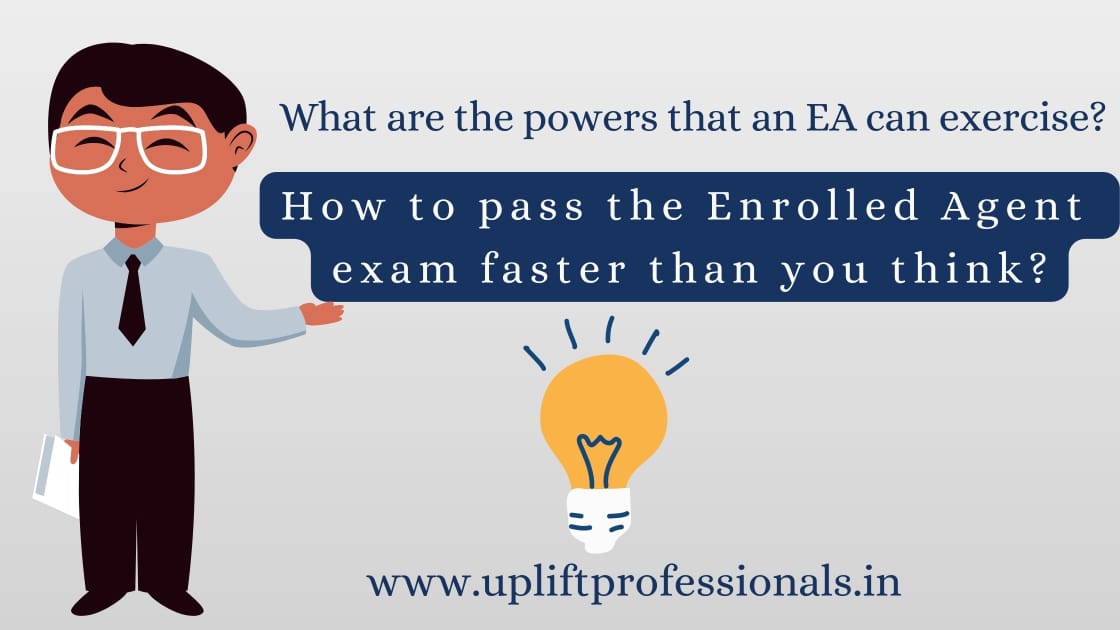What are the powers an EA can exercise?
An Enrolled Agent (EA), being an IRS certified tax professional, has the authority to exercise several powers related to tax matters.
They are briefed below:
Represent Taxpayers: EAs can represent taxpayers before the Internal Revenue Service (IRS) for tax-related matters, including audits, collections, and appeals.
Prepare Tax Returns: EAs are authorized to prepare and file tax returns for individuals, businesses, estates, trusts, and other entities.
Advise on Tax Matters: EAs can provide tax advice, guidance, and planning services to help taxpayers optimize their tax situations and comply with tax laws.
Correspond with IRS: EAs can communicate on behalf of taxpayers with the IRS, including written and verbal correspondence.
Attend IRS Interviews: EAs can attend interviews, meetings, and hearings with IRS officials to represent and assist taxpayers.
File Notices and Documents: EAs can file notices, forms, and documents with the IRS on behalf of taxpayers.
Appeals and Mediation: EAs can represent taxpayers in IRS appeals and mediation proceedings to resolve tax disputes.
Tax Court Representation: EAs can represent taxpayers in certain cases before the United States Tax Court.
Limited Practice Rights: EAs have limited practice rights before the IRS, allowing them to represent taxpayers in tax matters regardless of who prepared the tax return.
It’s important to note that while EAs have substantial authority in tax matters, there are certain limitations and specific procedures that they must follow to effectively represent taxpayers. Additionally, EAs must adhere to ethical standards and professional conduct guidelines established by the IRS.
How to pass the Enrolled Agent exam in first attempt?
Preparing for the Enrolled Agent (EA) exam involves several steps:
Understand the Exam: Familiarize yourself with the EA exam format, sections, and content areas.
Study Materials: Use reputable study materials, such as Surgent Uplift Review Courses, textbooks, and online resources specifically designed for the EA exam.
Create a Study Plan: Organize your study schedule, allocating sufficient time to cover all exam topics and sections.
Focus on Tax Content: The EA exam covers tax-related topics, so ensure you thoroughly understand tax laws, regulations, and concepts.
Practice Questions: Solve practice questions and sample exams to get comfortable with the question style and assess your knowledge.
Simulate Exam Conditions: Practice under timed conditions to simulate the actual exam environment.
Review and Revise: Continuously review your notes and study materials to reinforce your understanding.
Join Study Groups: Participate in study groups or forums to discuss challenging concepts and learn from others. At Uplift Pro, whatsapp groups are formed with students and faculties for 24/7 study support.
Seek Professional Help: Consider taking a review course or seeking guidance from experienced EAs to clarify doubts and get expert insights. Check with www.upliftprofessionals.in/us-ea-course.
Stay Updated: Stay informed about any updates or changes to tax laws that might be relevant to the exam.
Remember, consistent and focused preparation is key to success on the Enrolled Agent exam.
For more Information/Assistance, contact:
